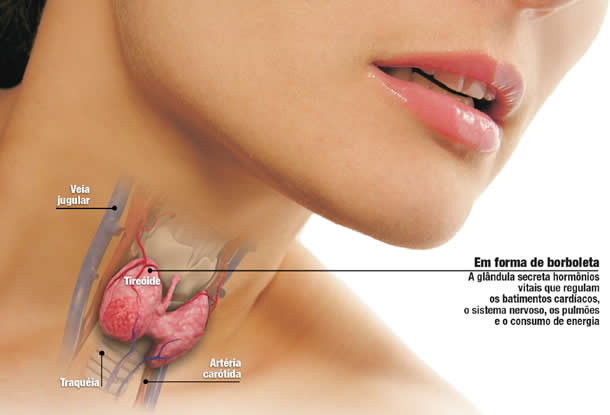Thyroid
- 9
- Sep
- 2015
The thyroid is a gland located in the front of the neck, is shaped like a butterfly and has two lobes (right and left), joined by a central part, called isthmus.
Hormones produced by the thyroid are the tyroxine (T4) and tri-iodothyronine (T3) and they are critical for the regulation of body temperature, blood pressure, cardiac frequency, muscle strength, bowel function, memory, mood and cholesterol among other functions.

The lack of producing these hormones properly causes symptoms related to the failure thereof, since the imbalance in the production of T3 and T4 can manifest as hypothyroidism (decrease) or hyperthyroidism (increase).
What are the main diseases caused by this and their symptoms?
1- Hypothyroidism: results from a decrease or complete absence of thyroid hormone production and can be caused by:
- Lack of TSH stimulation by the pituitary gland, as in some brain diseases;
- Lack of iodine in the diet;
- Autoimmune diseases, such one that occurs in the thyroid called Hashimoto, caused by antibodies against the thyroid cells;
- After surgery with partial or complete excision.
Symptoms range from: fatigue, drowsiness, lethargy, lack of concentration, dry and rough skin, hair loss, weight gain, menstrual irregularities, constipation and in the most severe cases heart failure.
2- Hyperthyroidism: the opposite of hypothyroidism . In hypothyroidism there is an increase in hormone production triodes which is caused in most cases by:
Antibodies (80% of cases), the presence of antibodies that stimulate increased production of hormones leading to the appearance of diffuse toxic goiter or serious diseases.
The most common symptoms include anxiety, insomnia, nervousness, irritability, loss of weight, palpitations, diarrhea, heat intolerance, muscle weakness, and ophthalmopathy.
3- Nodules: are due to a number of cells that are organized within the gland, forming solid or liquid nature of lumps (cysts).
Most lumps are astigmatic and are not related to cancer. They are usually detected by chance and can’t alter the production of T3 and T4. However, sometimes a biopsy to determine the prognosis is needed.
How to get a diagnosis and what tests should be done?
Medical evaluation is done by neck palpation to delineate the size, configuration and mobility of the thyroid gland and note whether or not there is any presence of nodules;
Periodic verification using functional study to determine blood levels of the hormone T4 TSH and research of anti-thyroid antibodies;
Thyroid ultrasound which allows the doctor to not only know the size and contours of the gland as well as the existence of nodes and their nature (solid or cystic, as well as evaluating the therapist response sequences studies;
Aspiration biopsy or cytology (examination of cells to determine whether it is benign or malignant).
With regard to treatment, the possibilities are:
- Just regular monitoring, without taking any medication if hormone levels are normal;
- The use of drugs to restore the hormone in the case of hypothyroidism or to decrease the excess in the case of hyperthyroidism;
- Surgical treatment with partial or complete excision of the thyroid gland.
It is important to be careful and consult your doctor if you notice any of the symptoms mentioned above.
Excerpt from Dr. Albertina Vieira
Deprecated: file_exists(): Passing null to parameter #1 ($filename) of type string is deprecated in /var/www/html/vivianefreitas.com/wp-includes/comment-template.php on line 1616



Joan Nelson
18th September 2015 at 12:01
Thank you so much for this important information. My sister has been affected by this. They could not operate on her as it was deemed too dangerous. She went on radiation treatment, now she is taking medication.
Adeola
18th September 2015 at 6:28
Thank you. Although I had little knowledge about he thyroid gland, this post has opened my awareness on the illnesses that can be involved, that I too should be watchful for.
Dami
17th September 2015 at 13:28
I never new about this illness, thank you for the information.
Ms guni
16th September 2015 at 0:09
Thank you. Please can you also cover intamancy topics for married, single and new mothers. I haven’t seen this covered by people of the. Faith .
Seretha
15th September 2015 at 19:11
Thanks for the info Mrs Freitas!
Sandra Bell
15th September 2015 at 18:00
Thank you for sharing this important information on the thyroid gland.